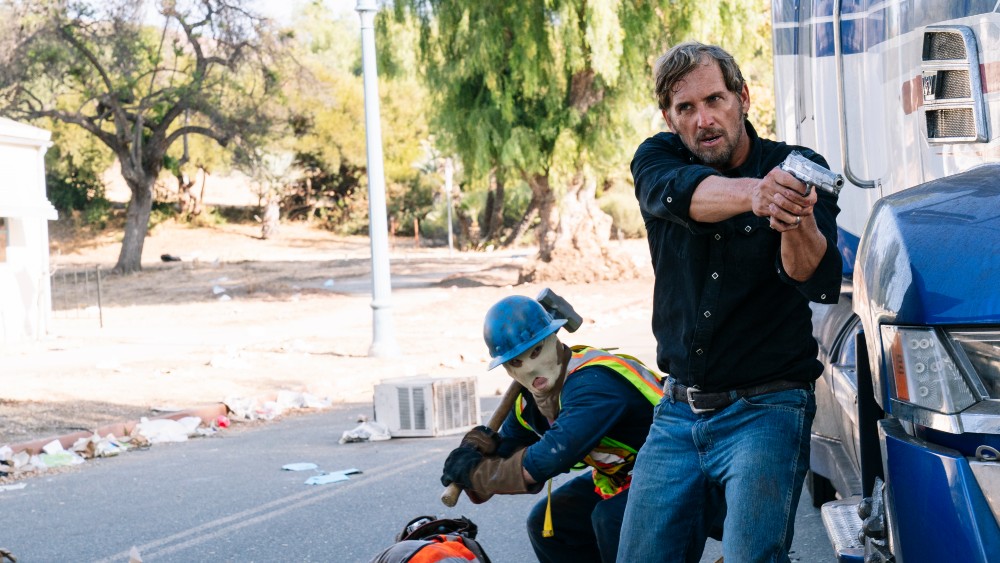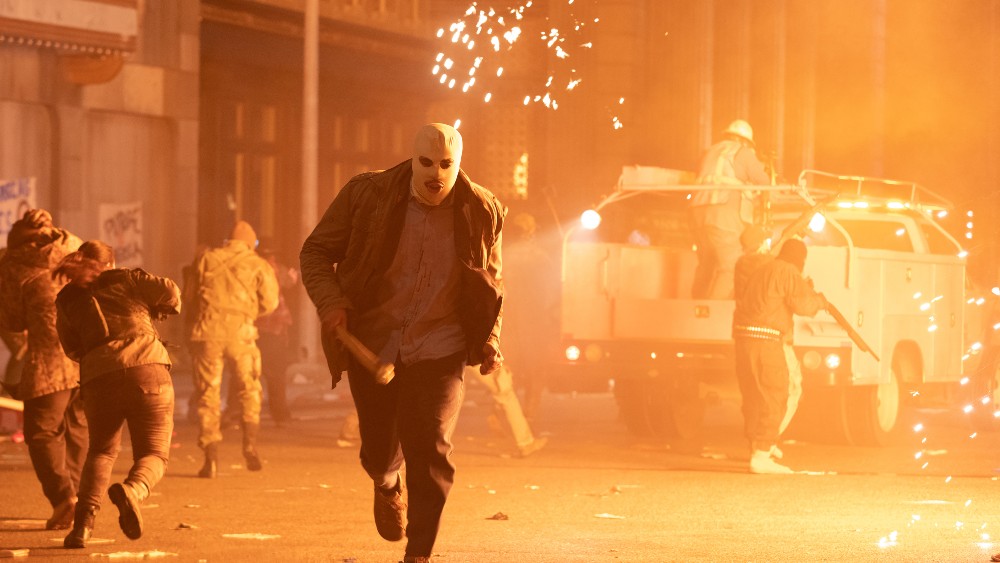
Amongst the many violent productions in Blumhouse’s expanding film library, The Purge series stands out as perhaps the most visually and viscerally aggressive. Set in a dystopian, future United States where all crime, including murder, is legal for 12 hours, the series has become a sort of political commentary of the evils that could befall our society should certain policy and political problems are not remedied.
But with each passing entry, as the body count piles and the murders become more sadistic, it has become clear that these movies live within the vicious cycle of brutality and cruel that they not-so-subtly condemn. The same is true for the supposed last film in the franchise, The Forever Purge. Although a stronger cast and more straightforward story makes this sequel significantly less boorish than most of its predecessors, it is ultimately impossible not to feel as if, by watching, you are contributing to the decline of American society that the film ominously denounces.
The Forever Purge is a supposed sequel to the third film in the entry, The Purge: Election Year, released in 2016 and modified just in time to point out the potential horrific consequences of having a facts-denying strongman in charge. You probably remember who ran for President that year. This film is set within the political ambit of the fascist-like organization that runs the United States– the New Founding Fathers of America (NFFA) — losing control of the new order they had established to retain control over American society.
The yearly 12-hour killing spree is no longer popular amongst some Americans, while the other half thinks that 12 hours a year is not enough, preferring instead 12 months. If the idea is that even in the future, Americans are hopeless divided down the middle, then the NFFA and the entire premise of The Purge— that a new order could arise — are invalidated by the film itself. If the idea is that violence begets violence, well, then why are we talking about this movie in the first place?
In any case. Things go very badly for the good ol’ U.S. of A. (as if legalized killing of citizens was not bad enough) when large swaths of disenchanted, white, racist, populations decide to continue the looting and murdering well past the 12-hour curfew. A group of such, young, disillusioned farm hands first takes it upon themselves to attack their patrons, the Tucker Family, let by patron Caleb (Will Patton), and which includes the also racist son Dylan (Josh Lucas), his wife Emma (Cassidy Freeman) and his sister Harper (Leven Rambin). The Tuckers are Republicans, like their farmhands (they live in Texas, after all), but they are moderate. The message, like everything else in James DeMonaco’s script, is not subtle — keep it this way, and Republicans will turn on Republicans, even in violent ways.
As if the obviously political pitch of the film were not spelled-out by now, DeMonaco (who created the series and directed its first three entries), goes further. It is two Mexican farmhands who also work on the property, including Tenoch Huerta’s Juan, who save the day and are later joined by an equally ferocious warrior and Juan’s wife, Adela (Ana de la Reguera). Soon, as the United States descends into chaos, Mexico and Canada announce a six-hour sanctuary policy permitting fleeing Americans to come into their countries before sealing the borders forever. There is no additional need to explain the plot—which you should witness for yourself—other than to note that all the liberal-pleasing cues will be hit along the road, by having the right types of good characters save the day while destroying the right types of bad ones.
More in order is wondering what exactly this film means for the greater sociopolitical moment in which it lives.
First, none of its dystopian future commentary is in any way original. Michael Bay, a producer on this film, has familiarity with disaster movies, and a classic scene from a climate change-focused film in that genre, The Day After Tomorrow, used the trope of Americans having to flee illegally into Mexico to make the point of “be good to thy neighbor” or perhaps “there but for the Grace of God go I.” Nor is the idea that the oppressed could turn to violence new, either. Just last year, a Mexican movie, in fact called The New Order, explored such a potential future, though the causes of that society’s collapse were more focused on inequality than The Forever Purge’s broader grab bag of ailments—gun proliferation, racism, jingoism, exceptionalism—that could lead to violent collapse. Everything is bigger in Texas, or maybe DeMonaco’s list of grievances with the Republican Party is longer than The New Order’s Michel Franco’s was with Mexican society.
The point is that when one of the wooden, swastika-tattooed skinheads in The Forever Purge declares that the sounds of gun battle on the streets are “the Music of America,” and such views are used as political fodder, the film is not breaking any new ground.
And, yet, despite The Forever Purge’s banality, there are at least two additional distressing layers worth exploring. The first is that the hoodlum who is declaring gun proliferation the reality of America is not wrong, and neither are the filmmakers who are deprecating our seeming self-condemnation into that reality. Nor is The Forever Purge wrong that chaos leads to chaos. In fact, one of the lingering issues with this series’ premise is that it never managed to explain how the government could actually control such levels of mayhem. It always seemed unrealistic that the guns would be set down exactly on curfew, and the story of The Forever Purge is more along the lines of what one would expect to occur, regardless of political persuasion. In other words, this film is more honest than its predecessors and that it depicts and entirely believable and even possible future—while allowing itself the indulgence of gratuitous violence to appeal to its basest instincts—is perhaps its most disturbing feature.
The second layer, though, is surely one that the filmmakers did not consciously intend, and would likely react askance if confronted with it: is there glorification of gore for commercial success not a very part of the problem of desensitized violence they complain about? Are all the breaking necks, the exploding heads, the spilling guts, not part of that endless news cycle of voyeurism, or morbidity, and of lies? Has Hollywood itself not played a role in barreling us towards this disturbing future?
It is easy enough for one– for anyone–to point out how the mantras and creeds of “the other side” have led to problems. It is much harder, but likely much more productive, to ask and answer what “my side” has done to contribute. The persistent belief that the boogeyman lives exclusively on the other side of the political aisle is a part of the problem. Republicans do not have a monopoly on being fiendish landlords. The Tucker Family surely exists in real life, but so do other such families I will not list by name to avoid liability issues, but that can be easily Googled as contributing just as equally to inequality, racial injustice, and violence. If any doubt remained that the entire premise of The Forever Purge is troubling, then simply watch the movie—where the badass violence of its protagonists is what ultimately saves the day.
I would be remiss if I did not mention that I very much enjoyed the performances by the two Mexican actors, Mr. Huerta and Ms. De la Reguera, who headline The Forever Purge. Both actually speak Mexican-sounding Spanish when they use that language, an easy thing for Hollywood to achieve that it has for the most part not bothered to. Both are also incredibly strong action-scene actors, and yes I was rooting for them to bloody up the baddies, against my better instincts. I also appreciate the film’s good intentions. In one particularly effective scene, the privileged Emma Tucker (a very solid Cassidy Freeman) hears of Adela’s troubled life story. Understanding the emotional impact and purpose of this scene, Director Everardo Gout lingers on Emma’s reaction long enough to convey that he knows how important sympathy is to community, and to working together to achieve a common goal and defeat a common enemy.
The problem for The Forever Purge is not its acting, its action scenes, nor its thrills. The problem is that the story treats the villains as if they do not understand that working together to achieve a common goal is important, and then has its own heroes adopt the mechanisms of the villains (violence) to defeat their enemies. The paradoxical nature of such ideologies should be apparent to all, but if they are not, the terrifying future this OK movie portends may soon be a reality, after all.
Grade: B-
Universal Pictures will release The Forever Purge in North America on July 2.
All pictures courtesy Universal,








